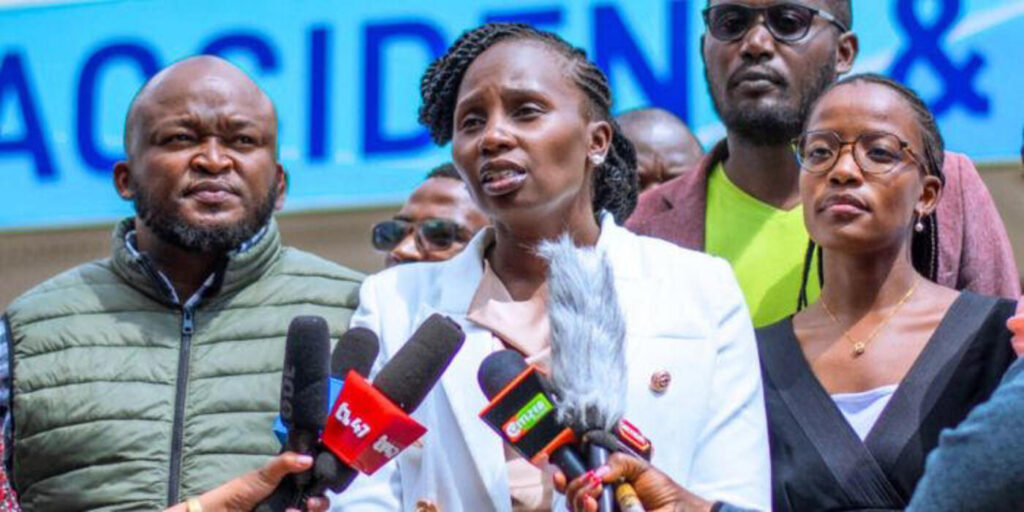Law Society of Kenya President Faith Odhiambo has raised significant concerns regarding the recent Supreme Court ruling on public participation, highlighting a critical need for clearer guidelines in Kenya’s legislative processes. “The current interpretation of what constitutes meaningful public participation remains dangerously ambiguous,” Odhiambo stated, emphasizing the need for more precise standards in legislative processes.

LSK President Faith Odhiambo addresses media during an earlier event; Courtesy Photo
The controversy stems from a constitutional challenge mounted by a diverse coalition of over 42 petitioners against the Finance Act 2023. Led by Busia Senator Okiya Omtatah and including the Law Society of Kenya, the Kenya Human Rights Commission, various trade unions, and consumer rights organizations, the petitioners challenged the constitutionality of the Housing Levy – a mandatory 1.5% deduction from employees’ gross monthly pay, matched by employers. “This levy was imposed without proper consultation with the public, making it both procedurally and substantially unconstitutional,” argued Omtatah in his petition.
In a landmark ruling that initially seemed to vindicate the petitioners’ concerns, High Court Judges David Majanja, Christine Meoli, and Lawrence Mugambi declared the Housing Levy unconstitutional in December 2023. Their comprehensive judgment cited multiple violations, including the absence of a proper legal framework for collecting and managing the fund, insufficient public participation, violation of taxation principles under Article 201, and discriminatory implementation against formal sector employees.
The government’s response came swiftly through Attorney General Justin Muturi, whose position on the matter raised eyebrows given his previous opposition to similar initiatives during his tenure as National Assembly Speaker. The grounds for appeal were extensive, encompassing alleged misinterpretation of constitutional provisions by the High Court, claims of substantial public participation through parliamentary processes, and arguments about the levy’s crucial role in the government’s affordable housing agenda. The appeal also emphasized potential economic impacts on ongoing housing projects worth billions and risks to international agreements in the housing sector.
The Supreme Court’s subsequent decision to allow continued implementation of the Housing Levy pending the full hearing has set a controversial precedent in Kenya’s constitutional jurisprudence. “This ruling effectively suspends a declaration of unconstitutionality by a competent court, creating a troubling precedent for our constitutional democracy,” noted a senior constitutional lawyer who requested anonymity. The decision has particularly raised concerns given a pattern of recent Supreme Court rulings that have appeared to favor government positions, including decisions on the 2022 Presidential election petition, the Basic Structure Doctrine, and the Social Health Insurance Fund case.
The government’s victory allows it to continue collecting the Housing Levy, targeting an ambitious annual collection of over Ksh 89 billion for the affordable housing program. However, legal experts and civil society leaders express deep concern about the implications for constitutional interpretation and democratic principles. “What we’re witnessing is a concerning trend,” remarked a constitutional law expert. “The Supreme Court seems to be increasingly deferential to executive preferences, particularly in cases with significant political implications.”
The relationship between the judiciary and the executive has come under increased scrutiny since President William Ruto’s administration took office. Observers note an apparent alignment between Supreme Court decisions and government positions, prompting widespread debate about judicial independence. “While we respect the court’s authority, we cannot ignore the pattern emerging from recent rulings,” stated a senior member of the LSK who requested anonymity. “The consistency with which government positions prevail in controversial cases merits careful scrutiny.”
“What concerns us most is the lack of clear parameters defining adequate public participation,” Odhiambo emphasized. “Without established guidelines, we risk reducing public participation to a mere checkbox exercise rather than a meaningful engagement process that truly captures the voice of Kenyans.” Under her leadership, the LSK continues to advocate for clear, quantifiable standards for public participation, enhanced transparency in legislative processes, stronger mechanisms for incorporating public feedback, and better documentation of public participation exercises.
“The essence of democracy lies in the people’s voice being heard and considered,” Odhiambo concluded. “We cannot allow public participation to become a mere formality in our legislative process.” As Kenya grapples with these important constitutional questions, the outcome of this case could fundamentally reshape how public participation is conducted in legislative processes, potentially transforming the relationship between the government and its citizens in policy-making.



















